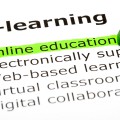 During a forum on how to improve U.S. K–12 schools, educators from the State University of New York (SUNY) Fredonia College of Education pointed out promising new developments in education.
During a forum on how to improve U.S. K–12 schools, educators from the State University of New York (SUNY) Fredonia College of Education pointed out promising new developments in education.
The forum, entitled “Challenges for Our Schools: Room for Optimism?”, was hosted by the League of Women Voters and focused on classroom reform and the role of teachers. The league invited higher-education students from SUNY Fredonia, as well as local residents, to hear three SUNY professors hold a free-form discussion on the topic.
The professors’ comments were recorded in local newspaper The Observer, which quoted them as speaking on the importance of early childhood education, improved student-data analysis, better use of technology in the classroom and advanced degrees for more educators.
Dr. Larry Maheady, professor of curriculum and instruction, and Dr. Mira Berkley, who specializes in early childhood education, both emphasized the vital importance of better early childhood programs.
One-third of students are set up to fail before they even enter the classroom, Maheady says, through lack of proper help in their early years. Berkley, for her part, stressed that early education helps students succeed through simple activities such as play-learning.
“We need to see children actively engaged in a first-hand, concrete experience in things that make sense to learn about,” Berkley said at the forum. These concerns have been echoed by President Barack Obama, who has promised increased emphasis on early childhood education in his 2013 State of the Union address, investing billions of dollars in Head Start, a pre-kindergarten program that helps children develop intellectually, socially and emotionally.
The measurement of student progress is also undergoing drastic changes. Dr. Cynthia Smith, the third forum participant, has worked in K-12 schools as well as in higher education. Her discussion focused on research in conjunction with student improvement. Smith says educators now have methods for vast data-gathering on each student. This individualized information helps supplement teaching plans, and Smith noted that it’s exciting for educators, as well as parents, to see the wealth of data available to help students.
Maheady also noted that teachers themselves are increasingly better educated, with more credentials and advanced degrees. Independent research has backed up that assertion: A USA Today report found that online bachelor’s and advanced degrees in education are increasing dramatically. The Master’s in Education Guide, a site that encourages degree programs in education, notes that many states have enacted high requirements for continuing education for teachers, requiring graduate-level courses in many cases.
[cf]skyword_tracking_tag[/cf]






No Comment